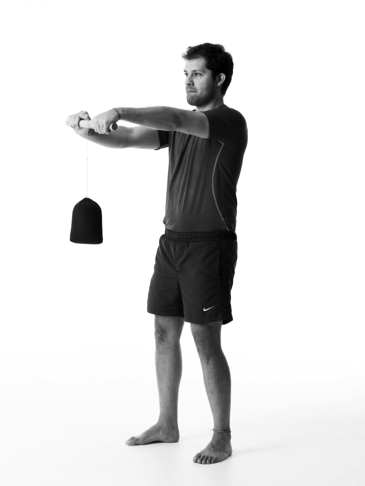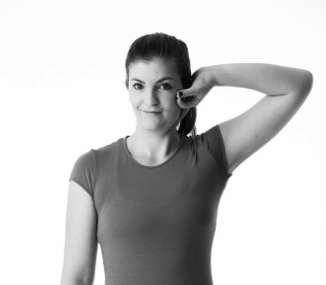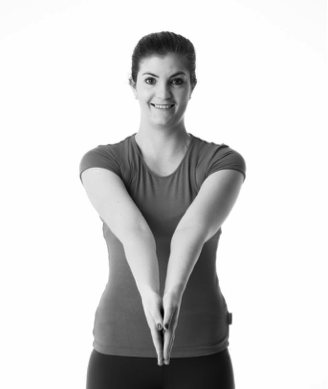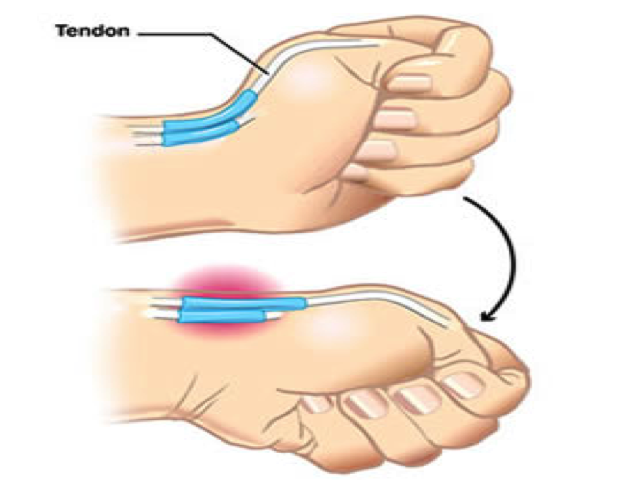De Quervain syndrome – exercises for recovery
Tue,Feb 02, 2016 at 01:27PM by Carla Mullins
What is de Quervain syndrome?
De Quervain syndrome is a painful inflammation of tendons in the thumb that extend to the wrist (tenosynovitis). The swollen tendons and their coverings rub against the narrow tunnel through which they pass. The result is pain at the base of the thumb and extending into the lower arm.
De Quervain syndrome is also known as mother’s wrist, BlackBerry thumb, texting thumb, gamer’s thumb, washerwoman’s sprain, radial styloid tenosynovitis, de Quervain disease, de Quervain’s tenosynovitis or de Quervain’s stenosing tenosynovitis.
A picture of the tendon and the general test for determining de Quervain syndrome is shown below.
Who is more likely to get de Quervain syndrome?
Women are 80% more likely than men to experience de Quervain syndrome. As a tendonitis condition it is generally a result of overuse. It is extremely common in mothers who have young babies and toddlers, as they are regularly carrying their babies on their forearms.
What to do about de Quervain syndrome?
If a person is starting to experience pain in the side of the wrists along to the thumb they should see a doctor or physiotherapist as soon as possible. If it is a tendonitis condition such as de Quervain syndrome the earlier they can address the inflammation the better your long-term outcome.
The general practice is to apply ice to reduce the inflammation and to apply a splint. The person will need to wear a splint 24 hours a day for between four and six weeks.
Exercises to strengthen the thumb and the wrists are important as part of the long term recovery from de Quervain syndrome. Below are some simple exercises that can be done at home to help strengthen your wrists and thumbs.

Wrist strengthening exercise. Start by tying a small weight or bag of rice to a stick via a long string. Begin with a light weight (250 grams). Slowly wind up the string around the dowel, focusing on moving the wrist right around. Try and roll the bag up and down.

Make a circle shape with your fingers as in the photo. Start to roll your arm around so that the wrist is pressing into your face and the thumb is in the cheek. Hold this stretch for about 3-5 seconds and then unwind the hand and repeat the exercise.

Press the hands together in a prayer shape then slowly flex the spine and press the hands away from the body. The idea is that you are going to press the hands down so that the finger tips are facing the floor and you are getting a stretch along the forearm and the wrist. At first this is just a stretch; over time we add resistance with a band or weight to start building strength. You would do this by tying a theraband or resistance band to a pole and face the pole, then sitting on the chair holding an end of the band in each hand. If you have a Gyrotonic tower you can sit facing the pulley tower and do the exercise “sailor “ instead with no weight and then with added weight.
Carla Mullins is co-director and co-owner of Body Organics, a multidisciplinary health and body movement practice with 3 studios in Brisbane. Carla is a Level 4 Professional Practitioner with the APMA and has also studied pilates with PITC as well as Polestar. She also has a LLB (QUT), M. Soc Sc & Policy (UNSW), Diploma Pilates Professional Practice (PITC), Gyrotonic Level 1, CoreAlign Level 1, 2 and 3 and Certificate IV in Training and Assessment.
 0
0 
